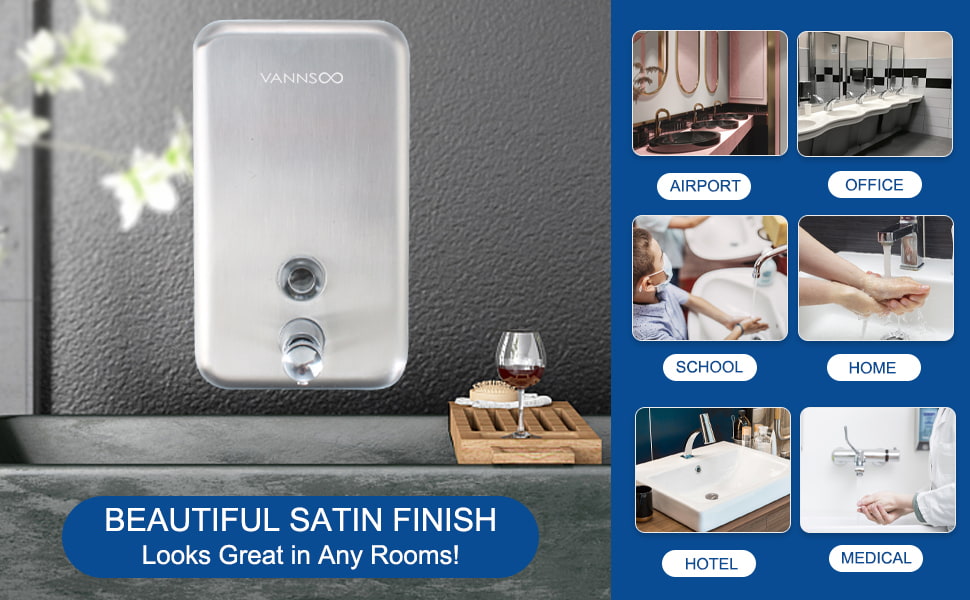Al elegir un dispensador de jabón, el material es crucial para la durabilidad, la higiene y la estética. Los materiales comunes incluyen plástico, vidrio, cerámica y acero inoxidable. Entre ellos, el acero inoxidable suele considerarse la mejor opción debido a sus numerosas ventajas.
1. Durabilidad y longevidad
El acero inoxidable es excepcionalmente duradero y resiste impactos, grietas y desgaste mejor que materiales como el plástico o el vidrio. Esto lo hace ideal para áreas de mucho tráfico, como baños públicos, restaurantes y hospitales, donde los dispensadores de jabón sufren un uso frecuente y posibles impactos accidentales.

2. Resistencia a la corrosión
Una ventaja clave del acero inoxidable es su resistencia al óxido y la corrosión, gracias a su contenido de cromo. Esto es crucial para entornos donde los dispensadores están expuestos a la humedad, como baños y cocinas, asegurando una vida útil más larga sin deterioro.
3. Higiene y Facilidad de Limpieza
La higiene es vital para los dispensadores de jabón, especialmente en entornos de atención médica y servicios de alimentos. El acero inoxidable no es poroso, lo que ayuda a prevenir la acumulación de bacterias y moho. Es fácil de limpiar y desinfectar, lo que garantiza un entorno sanitario y seguro.
4. Atractivo estético moderno
Los dispensadores de acero inoxidable brindan una apariencia elegante y moderna adecuada para diversos entornos, desde baños de oficinas minimalistas hasta restaurantes de alta gama. Sus líneas limpias y brillo natural los convierten en una opción atractiva para quienes buscan funcionalidad y estilo.
5. Sostenibilidad
El acero inoxidable es 100% reciclable, lo que lo convierte en una opción respetuosa con el medio ambiente. A diferencia del plástico, que contribuye a la contaminación, el acero inoxidable se puede reutilizar indefinidamente sin degradarse, alineándose con prácticas sostenibles.
6. Resistencia química
El acero inoxidable es resistente a los daños causados por diversos jabones, desinfectantes y productos químicos de limpieza. Esta cualidad garantiza que el dispensador mantenga su integridad estructural y apariencia, incluso con exposición frecuente a sustancias agresivas.
7. Rentabilidad a lo largo del tiempo
Aunque los dispensadores de acero inoxidable pueden tener un costo inicial más alto que las opciones de plástico o cerámica, su durabilidad y bajos requisitos de mantenimiento resultan en costos más bajos a largo plazo. Los reemplazos y reparaciones menos frecuentes significan un mejor valor con el tiempo.
8. Versatilidad y opciones de diseño
Los dispensadores de jabón de acero inoxidable están disponibles en varios diseños, incluidos modelos de pared, de encimera y sin contacto. Esta versatilidad permite soluciones personalizadas basadas en necesidades y preferencias específicas, desde instalaciones públicas hasta hogares privados.
9. Compatibilidad con la tecnología sin contacto
Los dispensadores de acero inoxidable suelen contar con tecnología sin contacto, lo que reduce el riesgo de contaminación cruzada al eliminar la necesidad de contacto directo. Esto los hace especialmente adecuados para entornos centrados en la higiene y la comodidad del usuario.
10. Mantenimiento mínimo
El acero inoxidable requiere poco mantenimiento para mantener su apariencia. Una simple limpieza con un paño húmedo o un detergente suave suele ser suficiente para mantenerlo libre de huellas dactilares y manchas, lo que reduce los costos de mano de obra y los esfuerzos de mantenimiento.
El acero inoxidable destaca como el mejor material para dispensadores de jabón debido a su durabilidad, beneficios higiénicos, estética moderna, sostenibilidad y rentabilidad. Ya sea para un baño público, un restaurante o una casa privada, dispensadores de jabón de acero inoxidable Proporcionar una solución equilibrada que cumpla con los requisitos funcionales y estéticos y al mismo tiempo respalde el valor a largo plazo.

 English
English Français
Français Русский
Русский Español
Español عربي
عربي 中文
中文



 IPv6 RED SOPORTADA
IPv6 RED SOPORTADA
